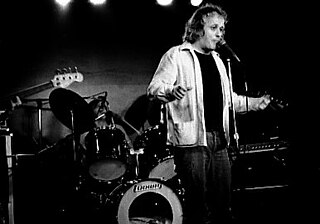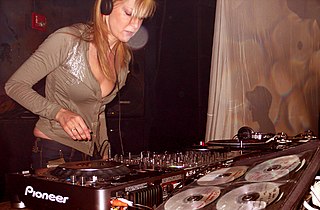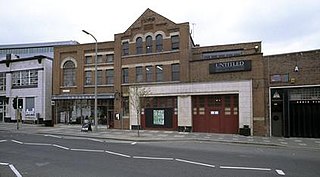
John Robert Parker Ravenscroft, known professionally as John Peel, was an English disc jockey (DJ) and radio presenter. He was the longest-serving of the original BBC Radio 1 DJs, broadcasting regularly from 1967 until his death in 2004.

Liverpool is a city and metropolitan borough in Merseyside, North West England, with a population of 500,500 in 2022. The city is part of a broader metropolitan area that is the fifth largest in the United Kingdom, with a population of 2.24 million. A historic port city, Liverpool lies on the eastern side of the Mersey Estuary adjacent to the Irish Sea. The city was an important part of the Industrial Revolution in Great Britain and a vital hub for trade. The city celebrated its 800th anniversary in 2007 and was named the 2008 European Capital of Culture. Its selection was credited with kickstarting an economic renaissance in the region. The city's modern economy has a significant influence on the knowledge sector, maritime industry, tourism, culture, hospitality, healthcare industry, life sciences, the creative and digital sectors.

Ian Davenport is an English abstract painter and former Turner Prize nominee.
Strange Fruit Records was an independent record label in the United Kingdom.

Kevin Coyne was an English musician, singer, composer, film-maker, and a writer of lyrics, stories and poems. The "anti-star" was born in Derby, Derbyshire, England, and died in his adopted home of Nuremberg, Bavaria, Germany.
The Festive Fifty was originally an annual list of the year's 50 best songs compiled at the end of the year and voted for by listeners to John Peel's BBC Radio 1 show. It was usually dominated by indie and rock songs which did not fully represent the diversity of music played by Peel but rather the majority opinion among his listeners. After Peel's death the tradition of the Festive Fifty was continued, first by other Radio 1 DJs and then by the Internet radio station Dandelion Radio.

Mary Anne Hobbs is an English DJ and music journalist from Lancashire, England. She currently hosts the BBC Radio 6 Music weekday mid-morning show, Monday to Friday, 10:30 am – 1 pm, and her New Music Fix show, Thursday Night night into Friday morning, 1- – 2 am. She is also a curator of live events. In 2023 she will host her 3rd ALL QUEENS stage at All Points East. In 2019, she created a radical live show, Queens of the Electronic Underground for Manchester International Festival and assisted David Lynch with his musical presentation at the festival, following her series of shows, "Dark Matter" at MIF 2017. She staged a BBC Prom with Nils Frahm and A Winged Victory for the Sullen in 2015. She performs as a live DJ internationally, at events such as the opening of Switch House at TATE Modern and the TATE Britain re-hang celebrations in 2023.

Site Gallery is an art gallery in Sheffield, England. It specialises in moving image, new media and performance based art.
Tractor is an English rock band founded in Rochdale, Lancashire by guitarist/vocalist Jim Milne and drummer Steve Clayton in 1971. Both had been members of a beat group, The Way We Live, since 1966. They are notable both for their appreciation by John Peel and Julian Cope, but also for their longevity because as of 2007, they were still performing. The band was produced initially by schoolfriend sound engineer John Brierley.
Dandelion Radio is an internet radio station founded in June 2006 with the aim of pursuing the musical legacy of the popular and influential BBC Radio 1 disc jockey John Peel. The station takes its name from the record label Dandelion Records founded and run by Peel between 1969 and 1972.

Tall Pony was a band consisting of Paul Towey and Tony Gage from Cheltenham and Gloucester.
Stack Waddy were an English blues rock band from Timperley, Cheshire, who were active in the late 1960s and early 1970s and again in 2007. Signed to John Peel's Dandelion label, the original line-up of John Knail, Mick Stott, Stuart Banham and Steve Revel released two albums and singles before breaking up for a while in 1973.
Iain Forsyth and Jane Pollard are British artists and filmmakers.

"There Are Listed Buildings" is a song by Welsh indie pop band Los Campesinos!, released on 2 November 2009 as the lead single to their third studio album Romance Is Boring. It was initially distributed via digital download and as a seven-inch single only available on their 2009 UK tour. Frontman Gareth Paisey said the track was influenced by the work of Death Cab for Cutie.
Susan Mary Philipsz OBE is a Scottish artist who won the 2010 Turner Prize. Originally a sculptor, she is best known for her sound installations. She records herself singing a cappella versions of songs which are replayed over a public address system in the gallery or other installation. She currently lives and works in Berlin.
Lubaina Himid is a British artist and curator. She is a professor of contemporary art at the University of Central Lancashire. Her art focuses on themes of cultural history and reclaiming identities.

Mike Stubbs is a curator/director and filmmaker based in the UK, currently, the Creative Producer at Doncaster Creates. For 11 years he was the Director/CEO of FACT, the Foundation for Art and Creative Technology, a leading arts organisation for the commissioning and presentation of new media art forms. He has been a key contributor to the development of culture and cultural policy in Liverpool, UK. Stubbs was jointly appointed in May 2007 by Liverpool John Moores University, where he is Professor of Art, Media and Curating. He is father to two daughters Saskia and Lola Czarnecki-stubbs.

Royal Blood are an English rock duo formed in Worthing in 2011. The current lineup consists of Mike Kerr and Ben Thatcher (drums). Their signature sound is built around Kerr's bass playing style, which sees him using various effects pedals and amps to make his bass guitar sound like an electric guitar and bass guitar at the same time. The duo were signed by Warner Chappell Music in 2013 and have since released four studio albums: Royal Blood (2014), How Did We Get So Dark? (2017), Typhoons (2021), and Back to the Water Below (2023).

Rooney were a British DIY band that released three albums between 1998 and 2000, including the debut album Time on Their Hands which received much support from John Peel, who booked them for a session in 1999. They reached number 44 in Peel’s Festive Fifty of 1998. The lo-fi music incorporated sometimes humorous — but often unsettling — spoken-sung lyrics describing everyday, mundane activities and observations, an approach which was consistent across all Rooney releases.

Professor Ross Sinclair is a Scottish visual artist, musician and writer. He lives and works in Kilcreggan, Argyll and is currently Reader in Contemporary Art Practice at The Glasgow School of Art, whilst also maintaining his professional practice. Sinclair was one of the key figures in the movement of contemporary artists in Glasgow in the 1990s, dubbed the 'Glasgow Miracle' by art curator and critic Hans-Ulrich Obrist.












